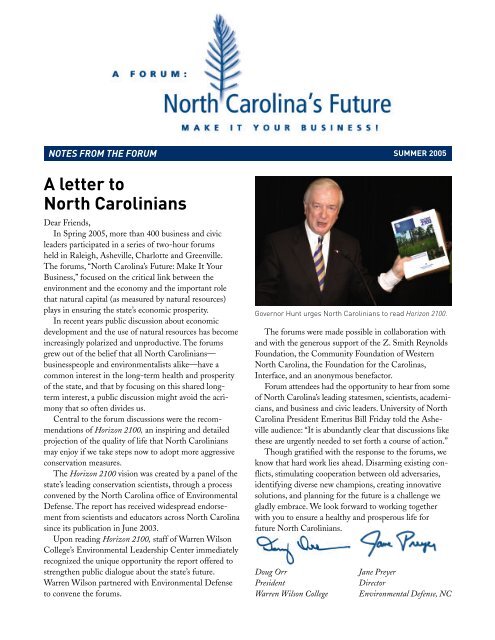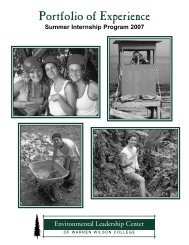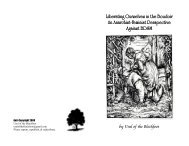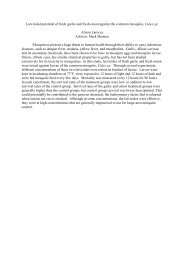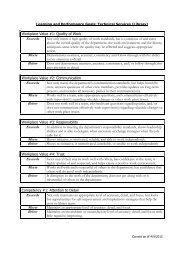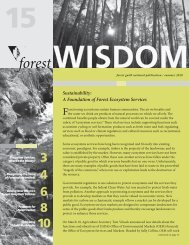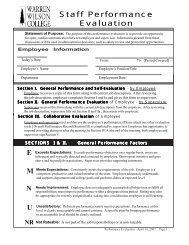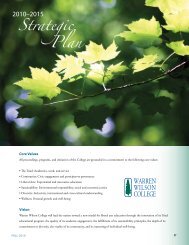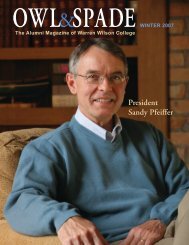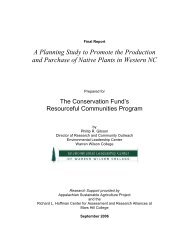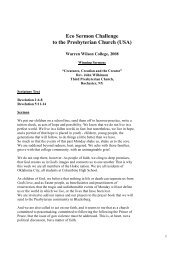here. - Warren Wilson College
here. - Warren Wilson College
here. - Warren Wilson College
Create successful ePaper yourself
Turn your PDF publications into a flip-book with our unique Google optimized e-Paper software.
NOTES FROM THE FORUM SUMMER 2005<br />
A letter to<br />
North Carolinians<br />
Dear Friends,<br />
In Spring 2005, more than 400 business and civic<br />
leaders participated in a series of two-hour forums<br />
held in Raleigh, Asheville, Charlotte and Greenville.<br />
The forums, “North Carolina’s Future: Make It Your<br />
Business,” focused on the critical link between the<br />
environment and the economy and the important role<br />
that natural capital (as measured by natural resources)<br />
plays in ensuring the state’s economic prosperity.<br />
In recent years public discussion about economic<br />
development and the use of natural resources has become<br />
increasingly polarized and unproductive. The forums<br />
grew out of the belief that all North Carolinians—<br />
businesspeople and environmentalists alike—have a<br />
common interest in the long-term health and prosperity<br />
of the state, and that by focusing on this shared longterm<br />
interest, a public discussion might avoid the acrimony<br />
that so often divides us.<br />
Central to the forum discussions were the recommendations<br />
of Horizon 2100, an inspiring and detailed<br />
projection of the quality of life that North Carolinians<br />
may enjoy if we take steps now to adopt more aggressive<br />
conservation measures.<br />
The Horizon 2100 vision was created by a panel of the<br />
state’s leading conservation scientists, through a process<br />
convened by the North Carolina office of Environmental<br />
Defense. The report has received widespread endorsement<br />
from scientists and educators across North Carolina<br />
since its publication in June 2003.<br />
Upon reading Horizon 2100, staff of <strong>Warren</strong> <strong>Wilson</strong><br />
<strong>College</strong>’s Environmental Leadership Center immediately<br />
recognized the unique opportunity the report offered to<br />
strengthen public dialogue about the state’s future.<br />
<strong>Warren</strong> <strong>Wilson</strong> partnered with Environmental Defense<br />
to convene the forums.<br />
Governor Hunt urges North Carolinians to read Horizon 2100.<br />
The forums were made possible in collaboration with<br />
and with the generous support of the Z. Smith Reynolds<br />
Foundation, the Community Foundation of Western<br />
North Carolina, the Foundation for the Carolinas,<br />
Interface, and an anonymous benefactor.<br />
Forum attendees had the opportunity to hear from some<br />
of North Carolina’s leading statesmen, scientists, academicians,<br />
and business and civic leaders. University of North<br />
Carolina President Emeritus Bill Friday told the Asheville<br />
audience: “It is abundantly clear that discussions like<br />
these are urgently needed to set forth a course of action.”<br />
Though gratified with the response to the forums, we<br />
know that hard work lies ahead. Disarming existing conflicts,<br />
stimulating cooperation between old adversaries,<br />
identifying diverse new champions, creating innovative<br />
solutions, and planning for the future is a challenge we<br />
gladly embrace. We look forward to working together<br />
with you to ensure a healthy and prosperous life for<br />
future North Carolinians.<br />
Doug Orr<br />
President<br />
<strong>Warren</strong> <strong>Wilson</strong> <strong>College</strong><br />
Jane Preyer<br />
Director<br />
Environmental Defense, NC
Keynote speakers<br />
set tone<br />
State leaders inspire forums about<br />
the challenges ahead<br />
Holding up a copy of Horizon 2100, former Governor<br />
Jim Hunt enthusiastically kicked off the forum in<br />
Raleigh, saying, “I hope you have the chance to read<br />
this thoroughly, and to study it.” Praising the report’s<br />
“optimistic, long-term vision,” he emphasized that a<br />
clean and healthy environment would be essential to<br />
attracting the best, creative businesses that could fuel<br />
North Carolina’s future economy.<br />
Hunt set a tone of personal, heartfelt passion that<br />
subsequently resounded from Asheville to Greenville<br />
when he spoke about our duty to both those who have<br />
come before and those who will follow. He spoke of<br />
what he learned on “soil conservation Sundays” from<br />
his father, and he evoked the aspirations of his granddaughter,<br />
Gracie, concluding, “We’re <strong>here</strong> for our<br />
children and grandchildren. We’ve got to look ahead.”<br />
Hunt was one of four of North Carolina’s most<br />
distinguished native sons providing energetic and<br />
inspiring keynote speeches at the forums. Their<br />
comments sparked lively discussions about the state’s<br />
long-term future.<br />
In Asheville, University of North Carolina President<br />
Emeritus Bill Friday echoed Hunt’s sentiments about<br />
Horizon 2100, saying “it is a well-integrated, knowledgebased<br />
presentation that gives a long-range perspective.”<br />
Friday, who presided over North Carolina’s university<br />
system for 30 years as it grew from three to 16 campuses,<br />
is widely considered the “leader of leaders” in the state.<br />
He came to his point quickly: “Business, industry,<br />
agriculture and all of our communities must have clean<br />
water. We must have air as pure as possible. We must<br />
have mountains and meadows, rivers and streams, and<br />
sand dunes if we are to have the quality of life that<br />
underpins our democracy.”<br />
Noting “we live in a state undergoing enormous and<br />
dramatic change,” Friday observed the need to integrate<br />
environmental policies and plans for economic<br />
development into a single vision.<br />
“We must make up our minds that we’re going to<br />
move toward a policy of intelligent conservation because<br />
Special appreciation goes to the hosts of the forums:<br />
Raleigh, Dr. Betsy Bennett, Director, NC Museum of<br />
Natural Sciences; Asheville, Dr. Doug Orr, President,<br />
<strong>Warren</strong> <strong>Wilson</strong> <strong>College</strong>; Charlotte, Dr. Jim Woodward,<br />
Chancellor, University of North Carolina at Charlotte;<br />
Greenville, Dr. Steve Ballard, Chancellor, East Carolina<br />
University.<br />
we know now of its great importance to economic development,<br />
tourism, agriculture and the quality of life we all<br />
aspire to have,” he said.<br />
Skeptics welcome<br />
In Charlotte, former Governor Jim Martin used a series<br />
of slides to depict North Carolina’s rapid population<br />
growth over the past 100 years. “Is this growth trend<br />
acceptable Is it inevitable Do we sustain it, or oppose<br />
it, or just accept it” he asked.<br />
A former chemistry professor, Martin offered<br />
provocative insight throughout the afternoon, and<br />
challenged people from either side of an issue to work<br />
collaboratively. “Let’s all stretch our thinking,” he told<br />
the audience.<br />
Martin spoke of the need “to identify the most serious<br />
problems that we can do something about, and build<br />
bipartisan coalitions to address those issues.”<br />
“You will have your own ideas about all this. You may<br />
be skeptical about industry, you may be skeptical about<br />
environmentalists—maybe both, and that’s okay. This<br />
dialogue deserves our best effort,” Martin said.<br />
At the final forum in Greenville, Dr. Jim Leutze,<br />
interim director of the North Carolina Progress Board<br />
and chancellor emeritus of the University of North<br />
Carolina at Wilmington, told the audience that the state<br />
needs “a new recognition of common interests.<br />
“Polarization, name-calling and stereotyping get us<br />
now<strong>here</strong>,” Leutze said. Urging support for the recently<br />
adopted Coastal Habitat Protection Plan and maintenance<br />
of the Inter-Coastal Waterway, Leutze called<br />
for the financial and political commitment to better longterm,<br />
environmental stewardship: “It is well past time<br />
that we begin to work together, that we begin to see our<br />
common interests, and take this long look down the road<br />
to w<strong>here</strong> we want to be. We have to have the support of<br />
the business community.”<br />
“These problems can’t be solved by any one group or by one special interest organization.<br />
We have to see the necessity of working together.”<br />
—Dr. Jim Leutze<br />
2 NOTES FROM THE FORUM
Good science informs<br />
better policies<br />
Ecologists demonstrate how<br />
aggressive conservation strategies<br />
could help realize the vision of a<br />
more vital North Carolina<br />
While acknowledging the inevitability of change during<br />
the next century—including a much larger population<br />
and a changing climate—Horizon 2100 outlines possible<br />
alternative futures for North Carolina. It presents two<br />
starkly contrasting images: one, a society and economy<br />
that are fed by a naturally healthy and functional<br />
environment; the other, a society subjected to the<br />
tyranny of a diminished environment and an impoverished<br />
human habitat.<br />
The conservation strategies called for in Horizon 2100<br />
were introduced to forum audiences by two of the state’s<br />
most eminent ecologists: Dr. William Schlesinger, dean<br />
of the Nicholas School of the Environment and Earth<br />
Sciences at Duke University; and Dr. Charles (Pete)<br />
Peterson, professor of biology and marine ecology at<br />
the University of North Carolina-Chapel Hill.<br />
“Horizon 2100 asks the question: ‘What does North<br />
Carolina aspire to be in the<br />
future’” Dr. Schlesinger told<br />
the Raleigh audience.<br />
“What will be the quality of<br />
life experienced by our<br />
grandchildren What about<br />
the air they breathe, the<br />
water they drink, the natural<br />
areas they will visit, and the<br />
livelihoods that they might<br />
gain from the land and sea<br />
that surround them<br />
“A healthy natural environment<br />
provides ecosystem<br />
services—abundant clean<br />
water and air, fertile soils<br />
and productive forests—<br />
that benefit us all,” Dr.<br />
Schlesinger said. By protecting<br />
our watersheds, and<br />
conserving the landscape—<br />
urban and rural, parts<br />
human-dominated and parts<br />
natural —as a single, integrated<br />
and functional ecosystem,<br />
“future generations of North Carolinians can<br />
experience as healthy a natural environment as we<br />
enjoy today.”<br />
The Horizon 2100 plan has gained the endorsement<br />
of more than 130 of the state’s leading conservation<br />
scientists. But to attain this optimistic future, t<strong>here</strong><br />
exists perhaps only a 20-year window of opportunity<br />
to set our course. “Knowledge of ecological processes,<br />
present trends and projections provides the evidence<br />
that urges us to action,” Dr. Peterson told the audience<br />
in Greenville.<br />
The aggressive conservation advocated in Horizon 2100<br />
is more than “traditional preservationist ecology.” The<br />
plan seeks not to recreate the past or to simply preserve<br />
the present, but to rebuild and maintain the functional<br />
landscapes and watersheds that can naturally and costeffectively<br />
support human society.<br />
“Horizon 2100 asks us to take the long view,” Dr.<br />
Petersen said, “because from that perspective economic<br />
and environmental health coincide. In short time<br />
frames we are often deluded into thinking development<br />
that degrades the environment can be good for<br />
the economy; but when we consider the longer-term<br />
implications, we see that if the environment is degraded,<br />
then ultimately the economy will be comparably impoverished<br />
as well.”<br />
Ruth Shaw, President and CEO, Duke Power, interacts with Dean Bill Schlesinger, Duke<br />
University.<br />
Summer 2005 3
TALKING POINTS<br />
Business and community leaders share<br />
tactics for shaping North Carolina’s<br />
future<br />
Panelists for the Horizon 2100 forums were selected for<br />
their exemplary business and civic leadership. Representing<br />
diverse economic sectors, they nonetheless share<br />
the vision presented in Horizon 2100 and agree that the<br />
state’s future economic prosperity is inextricably linked<br />
to its environmental vitality.<br />
A common theme echoed throughout the forums was<br />
the urgent call for improved collaboration among the<br />
state’s science, environment and business sectors. Panelists<br />
recommended that North Carolina move swiftly, given<br />
the state’s burgeoning growth and very real threats to the<br />
quality of life for which North Carolina is renowned.<br />
From their professional viewpoints, panelists described<br />
a future that would include financial incentives and<br />
entrepreneurial, community-based initiatives to drive new<br />
markets for sustainable enterprise. Though their practical<br />
suggestions varied, they spoke with one voice, supporting<br />
the development of an integrated plan to deploy<br />
economic, human, and natural capital toward the<br />
cultivation of sustainable regional communities.<br />
On promoting stewardship:<br />
D. Jordan Whichard III, Chair, North Carolina Economic<br />
Development Board and Publisher, The Greenville Daily<br />
Reflector: “T<strong>here</strong> are significant parallels between the<br />
vision of state economic development leaders and that<br />
of Horizon 2100. The future economic prosperity of rural<br />
North Carolina rests on effective stewardship of resources.<br />
Improvements in communities will attract people to the<br />
region who, in turn, will invest in the emerging economy.<br />
Regional infrastructures will be required to promote<br />
specific sustainable economic development.”<br />
Van Eure, Owner, The Angus Barn: “We have to make<br />
the right decisions now. Everyone should have a ‘Life<br />
101’ class so that even the youngest citizens can learn<br />
that civic responsibility includes stewardship of the<br />
environment. Personal choices are a key. Recycling,<br />
for example, is something everyone can do, and it does<br />
make a difference, especially in large scale operations.”<br />
David Womack, President, Womack Electric: “We must<br />
change the paradigm of conservation in North Carolina. We<br />
must dispel the notion that t<strong>here</strong> is a disconnect between<br />
stewardship of natural resources and economic development.<br />
Since t<strong>here</strong> is not nearly enough money to take advantage<br />
of all the conservation opportunities, the conservation<br />
community must make the case and be versed in the connectivity<br />
between economic growth and conservation.”<br />
On creating economic incentives:<br />
Doug Fowler, Change Consultant, Bank of America:<br />
“The health of our company depends upon the health of<br />
the communities in which we do business. The business<br />
sector is well positioned to help communities move toward<br />
sustainability by identifying and pursuing market-based<br />
opportunities. For instance, increasing operational efficiency<br />
benefits the environment and the bottom line. For business,<br />
this is a viable model.”<br />
Ruth Shaw, President and CEO, Duke Power: “How do we<br />
establish a collective ‘us’ and take the longer view Bold<br />
President Bill Friday leads the Asheville discussion.<br />
4 NOTES FROM THE FORUM
moves are required to make a difference. For example, we<br />
at Duke Energy Corporation and Duke Power Company<br />
have openly stated that we favor immediate and mandatory<br />
action on carbon…Believe me, that is a bold statement<br />
if you run an energy company.”<br />
Tom Ross, Executive Director, Z. Smith Reynolds Foundation:<br />
“All decisions need to be made with attention to the<br />
triple bottom line, understanding the environmental, social<br />
and economic consequences of our actions. We must all<br />
work together, and the Clean Smokestacks Act is an example<br />
of what happens when we do. And we must develop<br />
incentives now to encourage people to do the right thing.”<br />
On encouraging sustainable growth:<br />
Smedes York, President, York Properties, Inc.: “The population<br />
projections for North Carolina are compelling.<br />
Compact development will be required to help respond to<br />
the housing needs. Mass transit plans will be required. We<br />
must change people’s mindsets to plan for and accommodate<br />
this growth and ensure sufficient open space.”<br />
Becky Anderson, Executive Director, HandMade in<br />
America: “Strong economies and vibrant natural resources<br />
are integral to healthy communities. The economic impact<br />
of sustainable business derived from these resources is<br />
huge and in western North Carolina, equivalent to some<br />
of the strongest manufacturing sectors. Be creative, be<br />
entrepreneurial, think community!”<br />
Valeria Lee, Executive Director, Golden LEAF Foundation:<br />
“The importance of economic development decisions<br />
crosses all ethnic, racial and social lines. We all must work<br />
together to ensure a prosperous future for all the citizens<br />
of this state. The revitalization of agriculture in North<br />
Carolina is essential to the creation of strong and sustainable<br />
communities. In the past, agriculture has provided<br />
character and economic benefit to North Carolina and<br />
through creative intervention can do so again.”<br />
On building partnerships:<br />
Bill Cobey, former Secretary of NC Department of Environment<br />
and Natural Resources, Consultant (a scheduled<br />
panelist who was unable to attend and submitted written<br />
comments): “We need more people who will think about<br />
David Womack, Pete Peterson, and Valeria Lee listen as<br />
Jordy Whichard addresses the Greenville audience.<br />
the long-term environmental consequences of each decision.<br />
The future welfare of the people of North Carolina is<br />
depending on us to provide this far-sighted leadership.”<br />
Mack Pearsall, Attorney, President of Pearsall<br />
Operating Company: “North Carolina is its environment.<br />
The future of this state will be determined by how we<br />
manage all of our capital—economic, human and natural.<br />
We must build trust between environmentalists and<br />
business communities so that we can create a plan to<br />
balance economic growth and environmental protection.”<br />
Todd Mansfield, President and CEO, Crosland, Inc.:<br />
“Inclusive and respectful dialogue is required; without it the<br />
environmental community is being politically marginalized.<br />
People have tremendous concerns about the path we’re on,<br />
but they are not engaging politically. We need to reframe<br />
public discussions. I do hope we are in the midst of a shift<br />
in ethos w<strong>here</strong>in green issues are becoming more important.<br />
If so, the businesses that anticipate this shift will<br />
be more competitive. Economics and market forces can<br />
lead to far more conservation progress than pious talk.”<br />
Jack Cecil, President and CEO, Biltmore Farms, Inc.:<br />
“Horizon 2100 must be successfully tackled not only<br />
statewide but also on a regional basis. We must develop<br />
communities that integrate education, healthcare, economic<br />
development, arts and culture plus the environment<br />
in a mixed use, master plan design. This comprehensive<br />
approach to community development will ensure healthy<br />
regions across the state which will facilitate a prosperous<br />
North Carolina.”<br />
“The people of North Carolina understand the shared responsibility we have to both a vibrant<br />
environment and a thriving economy. Gone are the days of the ‘either/or’ mentality. The<br />
people of this state know we can and must do better.”<br />
—Tom Ross, Executive Director, Z. Smith Reynolds Foundation, co-convener and sponsor of the Raleigh forum<br />
Summer 2005 5
Feedback: the audience<br />
engages<br />
The forums received high marks for meeting a fundamental<br />
objective: engaging an audience of business and civic leaders<br />
in discussions about North Carolina’s long-term future.<br />
Half of each two-hour forum was devoted to audience<br />
interaction. Stimulated by provocative presentations,<br />
audience members enthusiastically shared observations<br />
and concerns. Audience members noted potential<br />
obstacles and suggested strategies and measures for<br />
success. The general tone was one of cautious optimism.<br />
Because the presentations varied at each forum, the<br />
four discussions had a slightly different flavor:<br />
• In Raleigh, t<strong>here</strong> was a strong appeal for better<br />
environmental education.<br />
•<br />
In Asheville, t<strong>here</strong> were several specific suggestions<br />
for economic enterprises that would flow from the<br />
protection of the region’s renewable resources.<br />
• In Charlotte, much of the discussion centered on<br />
responding to sprawl and the potential for marketbased<br />
solutions to the energy dilemma.<br />
• In Greenville, t<strong>here</strong> was considerable comment<br />
about the implications of climate change on lowlying<br />
coastal lands.<br />
Audiences consistently noted the need for an allencompassing<br />
vision that includes a viable economy and<br />
all of the other elements to a good “quality of life.” In<br />
addition to healthy air and clean water, future North<br />
Carolinians deserve reliable health care, affordable<br />
housing, better education, more efficient transportation,<br />
full and meaningful employment, and accessible energy<br />
that is clean and safe.<br />
As one attendee put it, the vision should attend to “the<br />
triple-bottom-line in which environmentalists, businessmen<br />
or educators can easily recognize ‘their’ interests.”<br />
Another noted, “the vision should include a picture of<br />
urbanized human communities that are compatible with<br />
sustainable natural areas.”<br />
Defining the obstacles<br />
Audience comments clearly reflected the enormity<br />
of the challenges. One respondent used the term “silos<br />
One respondent noted, “the biggest obstacle to<br />
achieving the Horizon vision is single-issue advocates.”<br />
In closing the Charlotte gathering, Governor Jim Martin<br />
thanked the audience for “giving us the kind of response<br />
we had hoped for.”<br />
of retreat” to express the fundamental problem of<br />
narrow self-interest that many participants suggested<br />
as the single greatest obstacle to attaining the vision.<br />
Many suggested that such selfishness might yet be<br />
overcome through the communication of genuinely<br />
shared desires for the future. More than one respondent<br />
observed that the greatest problem was “short-term<br />
thinking and the idea that economics and environment<br />
are opposed.”<br />
Funding was seen as a block to implementing the<br />
Horizon 2100 vision. Many noted the challenges of<br />
securing adequate funds to achieve conservation<br />
objectives. No easy answers were offered to this<br />
dilemma, though comments from panelists and audience<br />
members urged reliable funding for important initiatives<br />
such as Land For Tomorrow and the Coastal Habitat<br />
Protection Plan, as positive first steps toward the<br />
Horizon 2100 vision.<br />
Attendees spoke of the need to “galvanize business<br />
leadership” behind recognition of “the long term benefits<br />
of smart conservation.” Suggested venues of approach to<br />
foster a new dialogue included chambers of commerce,<br />
civic clubs, and regional business organizations. The<br />
importance of outreach to minority constituencies was<br />
also noted.<br />
Speakers and attendees had the opportunity to continue<br />
conversations at receptions following each forum.<br />
6 NOTES FROM THE FORUM
“We all want North Carolina to be prosperous AND healthy—for our people and our<br />
communities. We have to work together to make it happen—individuals, business,<br />
government and nonprofits—at local, regional and statewide levels. T<strong>here</strong>’s a role for<br />
all of us.” —Pat Smith, Executive Director, Community Foundation of Western North Carolina, co-convener in Asheville<br />
What are the<br />
next steps<br />
Moving forward through a window<br />
of opportunity<br />
David Womack concluded his presentation with a<br />
rhetorical question, and a response: “Can conservation<br />
effectively coexist in a partnership with economic growth<br />
and development in North Carolina I don’t think that<br />
the answer is simply ‘Yes;’ I think that the answer is, ‘It<br />
has to!’”<br />
The forums and the ensuing public discourse about<br />
our long-term future will encourage all of us to look at<br />
things differently, and may well yield novel solutions to<br />
what have seemed intractable problems.<br />
Conveners are considering several strategies to build<br />
on the forums’ successes and to ensure the dialogue goes<br />
forward with trust and respect. Participation by business<br />
leaders and entrepreneurs will be critical in identifying<br />
new economic opportunities associated with enhanced<br />
and functional conservation.<br />
New partnerships, new primers<br />
At the top of the list is the establishment of a statewide<br />
panel to guide implementation of the Horizon 2100<br />
vision; in fact, several forum participants have already<br />
expressed interest in serving in such a capacity. By<br />
investing a modest amount of time thinking in a<br />
FOR MORE INFORMATION<br />
Visit www.environmentaldefense.org to view or<br />
download Horizon 2100 in PDF<br />
format (Adobe Acrobat Reader<br />
required).<br />
Call Environmental Defense<br />
at (919) 881-2601 to request<br />
a copy of Horizon 2100 or<br />
additional copies of this<br />
publication. Email<br />
forum@warren-wilson.edu<br />
to share your comments.<br />
Chancellor Jim Leutze confers with local business leaders<br />
following the Greenville forum.<br />
different, long-term context, such a panel of savvy<br />
business and civic leaders could produce some clear<br />
directions for jump-starting innovative economic engines.<br />
As a first step, this panel could immediately begin to<br />
articulate the many social and business needs that, along<br />
with vibrant landscapes and watersheds, are important<br />
to our future. In the coming months it may also consider<br />
a range of options to implement the Horizon 2100<br />
vision. Regional conversations will undoubtedly spark<br />
the evolution of unique local opportunities as well as<br />
statewide projects.<br />
New partners in implementing the Horizon 2100<br />
vision may emerge, such as the North Carolina Progress<br />
Board, the Institute for Environmental Policy Solutions<br />
at Duke University’s Nicholas School of the Environment<br />
and Earth Sciences, or the Center for Sustainable<br />
Enterprise at the University of North Carolina-Chapel<br />
Hill’s Kenan-Flagler School of Business.<br />
The panel may publish a primer on “Five Ways to<br />
Make Your Business Greener;” promote new legislation<br />
in the General Assembly; or recommend creating a trust<br />
fund for the incubation of sustainable economies.<br />
An audience member in Raleigh suggested promoting<br />
a North Carolina version of an AmeriCorps for<br />
conservation work.<br />
T<strong>here</strong> may also be opportunities for the panel to carry<br />
its conversation to wider audiences through public television<br />
and radio.<br />
Summer 2005 7
FORUM SPEAKERS<br />
RALEIGH<br />
April 21, 2005<br />
Co-convener<br />
Z. Smith Reynolds Foundation<br />
Host<br />
Betsy M. Bennett, Ph.D., Director, North<br />
Carolina Museum of Natural Sciences<br />
Moderator<br />
The Honorable James B. Hunt, Jr.<br />
Panelists<br />
Dean William H. Schlesinger, Ph.D.,<br />
Nicholas School of the Environment and<br />
Earth Sciences, Duke University<br />
Smedes York, York Properties, Inc.<br />
Van Eure, The Angus Barn<br />
William Cobey, former secretary of DENR<br />
ASHEVILLE<br />
April 27, 2005<br />
Co-convener<br />
Community Foundation of Western North<br />
Carolina<br />
Host<br />
President Doug Orr, Ph.D., <strong>Warren</strong> <strong>Wilson</strong><br />
<strong>College</strong><br />
Moderator<br />
President Emeritus William Friday,<br />
University of North Carolina<br />
Panelists<br />
Dean William H. Schlesinger, Ph.D.<br />
John F. A. V. Cecil, Biltmore Farms, Inc.<br />
Becky Anderson, HandMade In America<br />
Mack B. Pearsall, Pearsall Operating<br />
Company<br />
CHARLOTTE<br />
May 5, 2005<br />
Co-convener<br />
Foundation for the Carolinas<br />
Host<br />
Chancellor James H. Woodward,<br />
UNC–Charlotte<br />
Moderator<br />
The Honorable James G. Martin<br />
Panelists<br />
Dean William H. Schlesinger, Ph.D.<br />
Ruth G. Shaw, Ph.D., Duke Power Company<br />
Todd Mansfield, Crosland, Inc.<br />
Doug Fowler, Bank of America<br />
GREENVILLE<br />
May 19, 2005<br />
Co-convener<br />
Anonymous Benefactor<br />
Host<br />
Chancellor Steven Ballard, East Carolina<br />
University<br />
Moderator<br />
Chancellor Emeritus James R. Leutze,<br />
UNC–Wilmington<br />
Panelists<br />
Charles H. Peterson, Ph.D.,<br />
UNC–Chapel Hill<br />
Valeria L. Lee, Golden Leaf Foundation<br />
David H. Womack, Womack Electric<br />
D. Jordan Whichard, III, The Daily Reflector<br />
Environmental Leadership Center<br />
<strong>Warren</strong> <strong>Wilson</strong> <strong>College</strong><br />
CPO Box 6323<br />
NONPROFIT ORG.<br />
US POSTAGE<br />
PAID<br />
ASHEVILLE, NC<br />
PERMIT #575<br />
PO Box 9000<br />
Asheville, NC 28815-9000<br />
www.warren-wilson.edu/~elc/<br />
828.771.2002<br />
Printed on 100% recycled paper


